
Dr. Sigal Barsade, professor of Management at the Wharton School.
Wharton School professor Sigal Barsade died at the age of 56 on Feb. 7 of brain cancer.
Barsade joined Wharton in 2003 and taught at Penn for almost 20 years. She was widely acclaimed for pioneering research on the role of emotions in organizations.
Barsade contributed to research on the “affective revolution” by revealing the impact of negative emotions, such as anger, sadness, and fear, on workers' productivity. She published over 25 studies that are credited with helping to dismantle the notion that emotions should be ignored in the workplace.
In a 2014 interview, Barsade told The Wall Street Journal that when companies "foster a culture of companionate love, [they] will have more satisfied employees and a better work outcome."
At Wharton, Barsade instructed undergraduate and graduate students in courses ranging from micro-organizational behavior to leadership and team dynamics, including the core MBA course MGMT 610: "Foundation of Teamwork and Leadership." She won several awards for teaching over the years, including the Wharton Teaching Excellence Award in 2020 and MBA Excellence in Teaching Award in 2017.
Barsade also served as co-chair of the COVID-19 Vaccination Uptake Behavioral Science Task Force and on the Advisory Board of Penn’s Student Federal Credit Union.
She also consulted for businesses, nonprofits, and healthcare organizations, such as Coca Cola, Google, State Farm Insurance, Deloitte, the NBA, the United Nations, and Novartis. Her research has been published in leading journals and news outlets, such as Administrative Science Quarterly and Forbes.
Barsade's Wharton colleagues and students said that she embodied the empathy and thoughtfulness that she preached in her research.
Maggie Tang, a Wharton senior, worked closely with Barsade on two undergraduate theses focused on emotional culture in high-end restaurants and how to train the next generation of leaders in the hospitality industry.
She said that Barsade was “one of the first people who believed in her” and “a very passionate advisor [who was] always so excited whenever they spoke as she loved food herself."
Adam Grant, a professor of management at Wharton and leading organizational psychologist, wrote in an Instagram post that Barsade "was a big reason why [he] came to Wharton. She spent her life aiming for the best — not only for herself but for everyone else too."
Grant also mentioned that “after a dorm fire, she invited a student — a complete stranger — to stay at her house” and that "it was no surprise to learn that she cofounded a children’s museum and donated to a charity for blind donkeys."
Wharton Deputy Dean Nancy Rothbard was Barsade's best friend and colleague.
“She was an intellectual giant with a heart of gold. That is such a rare combination,” Rothbard told Wharton. “She was a true partner, a true friend, and she is an irreplaceable human being. I admired her and I loved her.”
Constantinos Coutifaris, a doctoral candidate in organizational behavior who worked closely with Barsade, told Wharton that “even when she was battling with brain cancer, she kept insisting we talk about how she could be helpful to me during our calls when all I wanted to do was be helpful to her."
Barsade was born in Israel in 1965 to Yaakov and Nili Goland. Her family moved to Los Angeles when she was 3 years old. She is survived by her husband, three children, brother, and parents.
She earned her bachelor's degree in psychology at the University of California, Los Angeles in 1986 and her Ph.D. in organizational behavior and industrial relations at the University of California, Berkeley in 1994.
Prior to teaching at Penn, Barsade taught at the Yale University School of Management for 10 years. She battled with glioblastoma for two years.
The Daily Pennsylvanian is an independent, student-run newspaper. Please consider making a donation to support the coverage that shapes the University. Your generosity ensures a future of strong journalism at Penn.
Donate




